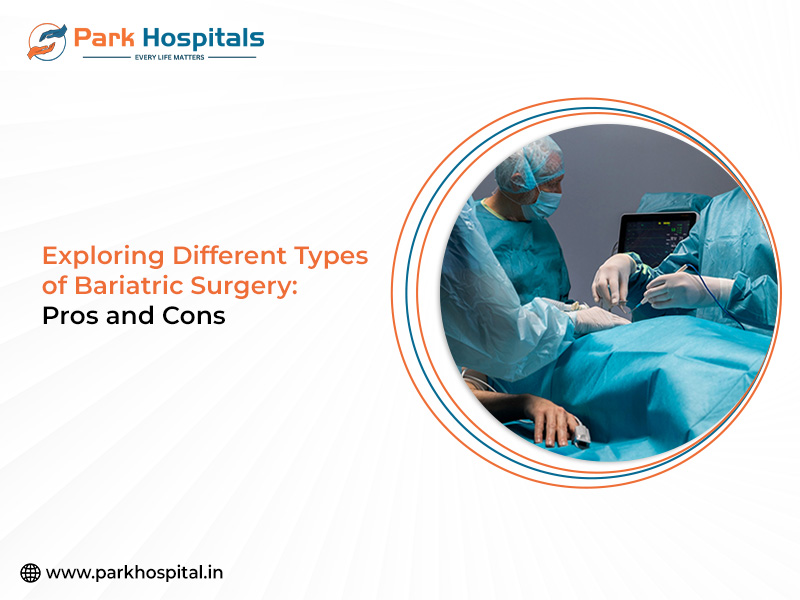What is bariatric surgery?
Bariatric surgery is also called weight loss surgery or metabolic surgery to help obese people lose weight who otherwise have failed to achieve excess weight loss through diet and exercise. The bariatric procedure can help to treat and prevent metabolic disorders such as obesity, diabetes, hypertension and fatty liver disease. Even teenagers with a BMI of 40 or with a BMI of 35 with type 2 diabetes or severe sleep apnea are candidates for weight loss surgery. However, such teens should be prepared for post-surgical lifestyle changes.
What are the types of bariatric surgery?
The different types of bariatric surgery are as follows
Gastric sleeve also called sleeve gastrectomy which is a common procedure that involves the removal of about 80% of the stomach portion. This procedure is aimed at decreasing your natural food intake capacity at a time, eventually reducing hunger hormones thereby decreasing your appetite. This can be helpful if you are diabetic as this procedure may lead to regulating blood sugar.
Gastric bypass also known as Roux-en-Y gastric bypass that creates a small intestine in the form of Y by dividing it and connecting it to a small pouch made at the top of your stomach. This facilitates the food flow through new smaller portions of the stomach and lower segments of the small intestine bypassing the rest. Again, this procedure also restricts the amount of food that the stomach pouch can hold and how much the small intestine can absorb. Unlike gastric sleeves, restricting small intestine absorption also makes this method more effective.
Biliopancreatic Diversion with Duodenal Switch (BPS-DS) this is a procedure that combines sleeve gastrectomy and intestinal bypass. This technique bypasses 75% of your small intestine making it the most effective surgical option for weight loss and improving diabetes. This procedure poses the risk of malnutrition and vitamin deficiencies which should be prevented by a balanced diet and vitamin supplementation.
Stomach Intestinal Pylorus Sparing Surgery (SIPS) This is a modified version of the duodenal switch, also known as the Loop Duodenal Switch or SADI-s. This new procedure is proving to be the most promising.
How much weight can you lose with bariatric surgery?
Although 90% of people undergoing bariatric surgery lose about 50% of their excess weight than normal, there are different results achieved with different kinds of surgeries such as
Average weight loss after sleeve gastrectomy is 30%-80%
After gastric bypass, it is about 50%-70% of excess body weight
After the duodenal switch, it is about 80% of the excess body weight
However, you may have to avoid any strenuous activity for at least up to 6 weeks and may take up to 12 weeks to be back on a normal diet. The advantages of such bariatric surgery include sustained weight loss, reduced hunger hormones, improved metabolism, correction of sleep apnea, blood sugar control, and cholesterol control contributing to your metabolic well-being.
What risks are associated with bariatric surgery procedures?
Excessive bleeding, infection
Blood clots, lung or breathing problems
Leaks in gastro intestinal system
Long-term complications could include
Bowel obstruction
Dumping syndrome that leads to diarrhea and lightheadedness.
Gallstones, hernias
Malnutrition, vomiting, ulcers, acid reflux.
Reflux disorders
What precautions should you take after bariatric surgery?
Eating small and more frequent meals (three to four small meals a day)
Intake of a balanced diet and vitamin supplementation
Slow eating
Avoid snacks
Regular non-strenuous exercise
Conclusion
Bariatric surgery is a proven procedure for the loss of 30%-80% of excess weight in obese patients depending on the procedure. Albeit the risks that are involved and the precautions to be taken post-surgery, the benefit that bariatric surgery offers is not just the weight loss but also the correction of concomitant metabolic complications such as type 2 diabetes, hypertension and other complications such as sleep apnea improving the overall quality of life.
Are you stressed because of being overweight? Done everything to lose weight and its not helping? Consult our expert Bariatric Surgeons with years of experience at Park Hospital. It is the best Bariatric surgery hospital that is equipped with the latest technologies for Bariatric Surgery.





